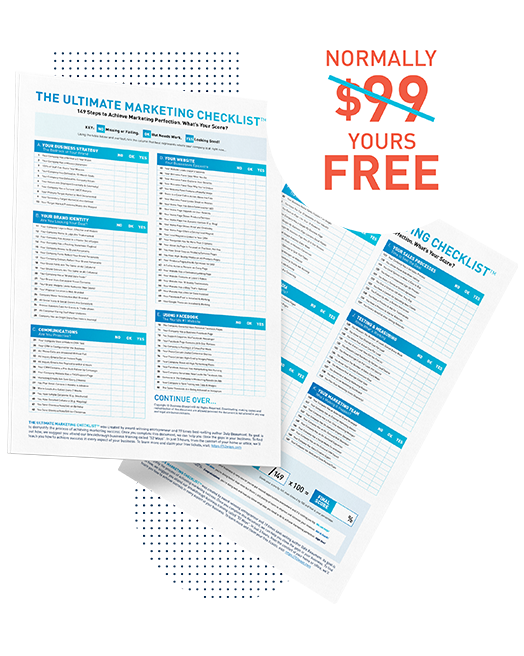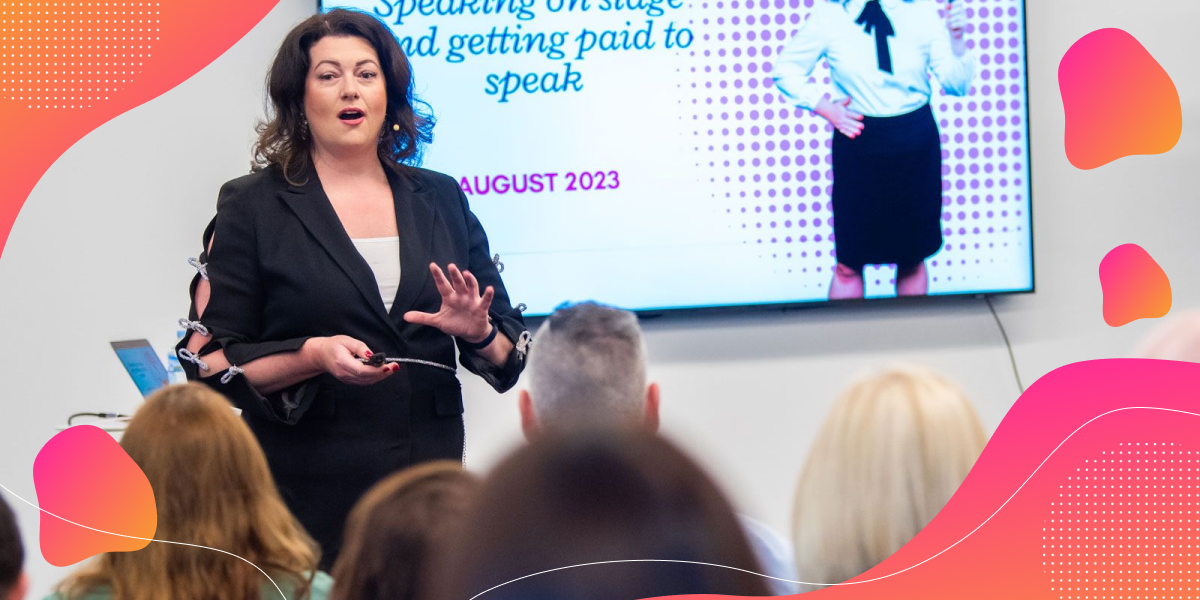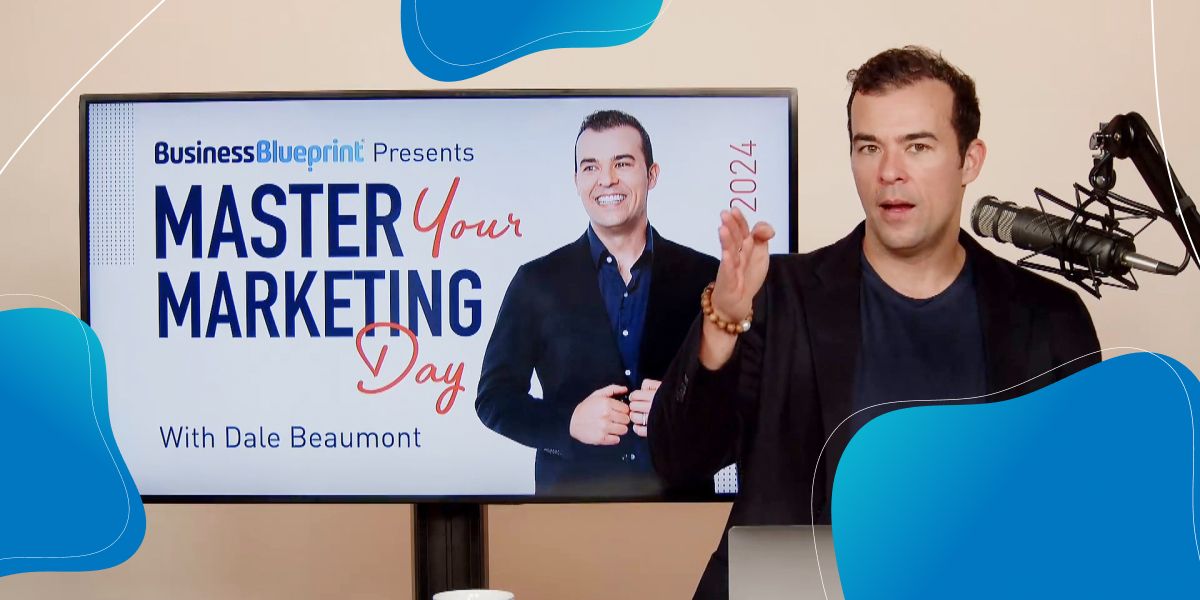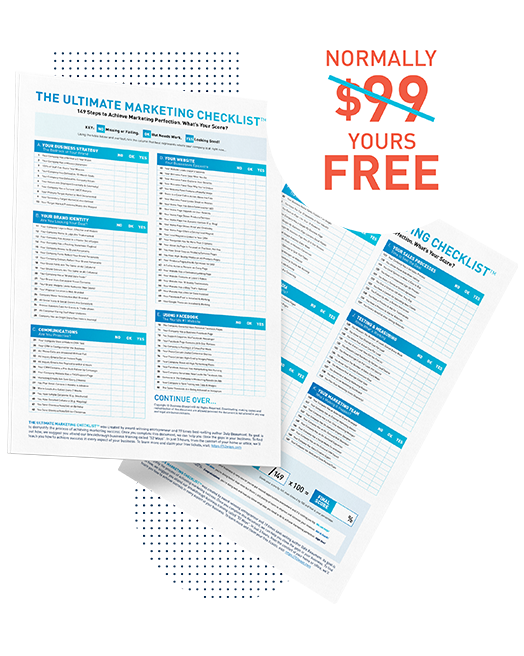If you’re a business owner, taking the leap to become a speaker benefits you on two levels.
First, you have the opportunity to stand in front of a brand new audience, many of whom will follow you on social media (and some may even become customers).
Speaking is also a potential revenue stream; you can charge thousands of dollars to appear in front of an audience for less than an hour.
Business Blueprint speaker Jamie Abbott is an expert on this subject, having spoken at events all over the world. She shared her insights with members at a recent conference.
How to find paid speaking gigs
After teaching over 100 people to find paid speaking gigs, Jamie says her most successful students are the ones who pitch and put themselves out there. “They’re not necessarily the best speakers or the most experienced or confident. But if you think about an EA who has been tasked with finding a speaker, if you fall into their lap, they’ll be happy you have reached out to them,” says Jamie.
Once you have spoken at one event, you may find other people approach you and want to book you for another engagement.
Jamie shared the following tips to get the ball rolling on your speaking experiences:
Craft a winning keynote topic
Craft your keynote around a subject you love to talk about and which will be relevant and interesting to your audience. Think about sharing personal experiences and transformational journeys.
“People just want to hear your story and what your journey has been,” says Jamie, “They want to know how you got from A to B.”
Jamie reiterates that there are some topics that sell better than others and ‘The Future’ is one of them. For example, ‘The next three years for real estate in Australia.’
“If you can offer predictions and include personal stories and anecdotes, roll with that,” says Jamie.
“Economics and finance are also important, especially if you can niche down,” adds Jamie. Practice using the structure of S.E.E, which is Statement, Evidence, Explanation. This will help you write your notes.
When you’re creating your presentation, be clear about what you want people to think and feel at the end. Once you have one or two topics you can speak on and have created a keynote, rehearse it. If you can, record yourself and listen back.
Create your profile as a speaker
Your next challenge is to find paid speaking opportunities and start to pitch.
To get started, create a one page PDF document to pitch yourself as a speaker. This will provide a snapshot of who you are and what you can speak about. Include a short bio, topics you can speak about and publications or broadcasts you have featured in.
Expand this to a four page bio with more details about your keynotes, a longer bio, testimonials and your AV requirements. This information can be used to create a speaker website or a page on your website as well. You can include headshots people can download so they can promote you as a speaker. Take this to the next level by adding an opt-in that lets people download your full speaker kit. Now you have an email address and you can follow up.
“Add the word ‘speaker’ to your LinkedIn or Facebook bio as well”, says Jamie. “This can put you front of mind for people who are looking for someone to present on stage.
Start to pitch
Before you pitch, you need to find gigs.
One easy place to start is with hashtag searches, which can uncover a wealth of speaking gigs, from virtual summits to in-person conferences.
#LeadershipSpeakersWanted #SpeakersWanted #CallForSpeakers can all deliver what you are looking for.
“Ask your VA to do a hashtag search every week,” says Jamie. “I was invited to speak in Canada, just from an Instagram search.”
You can also find gigs by searching with Google. “I searched for ‘Speakers wanted London August’ and found a conference to speak at overseas,” says Jamie. “I’ll also be hosting a workshop while away, and the gigs can cover my flight and help me to make some money while I am on a trip to the UK.”
Even if an event already has its speaker lineup, don’t be afraid to pitch yourself—you never know when there will be a last minute drop out. “The organisers may also be locking in their speakers for the next year,” says Jamie.
Facebook groups can be a source for speaking gigs as well. Join groups and send your invites so you can score speaking gigs.
You can also pitch to organisations like your local Chamber of Commerce or government departments and councils. Educational institutions can be places to speak as well.
Your final option is to look at registering with a speaker bureau, which may be keen to bring you on as a client (they will charge commission in return for finding gigs for you).
How much to charge
Whether you’re a seasoned professional or a newcomer to the stage, securing paid speaking engagements can be a game-changer for your profile and finances.
Jamie lives in Newcastle, two hours away from Sydney and she learned just how much good speakers are paid after receiving a request from a corporate client to speak in the city. “Because I had no time in my diary to do it, I quoted $30,000 instead of $3,000. It took them 46 minutes to hit accept on the quote to do 8 hours of workshops with different managers. I learned from that that I had been undercharging for many years. It was a real line in the sand moment and I decided to charge no less than $10,000 for each speaking gig.”
Jamie had previously been charging low prices or speaking for free for the exposure. However, “I booked less gigs than I do now that I charge $10,000 plus to speak on stage.”
You don’t have to be a professional speaker who has had elocution lessons or speaks full time to earn money as a speaker. There are a lot more gigs than there are speakers, so if you have a story to share that is motivating or inspiring, you can put your hand up and create a new revenue stream for yourself.
“Don’t give away your knowledge for free, especially when someone else is making money off you as a speaker.”
If you’re speaking at a conference and delegates are paying a couple of thousand dollars to attend, you do need to back yourself and ask to be paid.
Note: While charging to speak is a great habit, you may decide to speak for free if you believe you can walk off stage with enough new clients to cover the amount you would charge. This is what’s referred to as being a ‘platform speaker’.
Tips to be confident as a speaker
Some quick pointers from Jamie include:
- Be aware of the event schedule and know when you will be on stage so you are ready
- Think about time and plan to run short. This is because events often run over time. You can always leave time to take questions at the end
- Confirm your speaking topic before the event, just in case
- If you are very nervous about remembering the material, write out your speech in full and use your slides to
- prompt you to remember what you’re talking about
- Have something mentally prepared just in case you forget what you are talking about
- Include statistics as well as stories
- Wrap ‘facts’ in stories and they are more likely to be remembered.
Business Blueprint members access online recordings of every single presentation from our conferences and training events. To access Jamie’s presentation in full, book a call with our team today.




